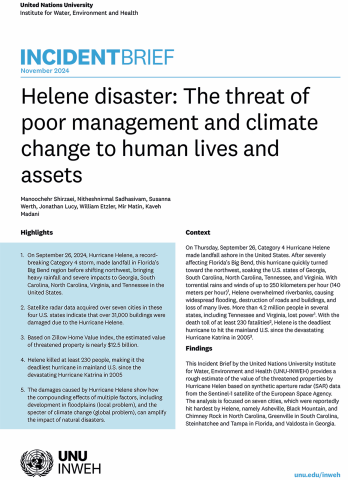Shirzaei, M., Sadhasivam, N., Werth, S., Lucy, J., Etzler, W., Matin, M., Madani, K. (2024). Helene Disaster: The Threat of Poor Management and Climate Change to Human Lives and Assets, United Nations University Institute for Water, Environment and Health (UNU-INWEH), Richmond Hill, Ontario, Canada, doi: 10.53328/INR24MSIR001.
Download the incident brief

Hurricane Helene made landfall in Florida’s Big Bend region before moving northwest, affecting Georgia, South Carolina, North Carolina, Virginia, and Tennessee. The hurricane caused extensive damage, with over 31,000 buildings affected and an estimated $12.5 billion in threatened property value. The death toll reached at least 230, making Helene the deadliest hurricane to hit the mainland U.S. since Hurricane Katrina in 2005.
While the frequency of weather events such as Hurricane Helene are increasing due to climate change, the impact and damage caused by them can not be attributed to climate change only. The expansion of human settlements into vulnerable flood zones and the degradation of critical infrastructure have significantly worsened the impact of such events. Many of the damaged areas lack adequate flood protection, and outdated infrastructure was not designed to withstand the magnitude of storms exacerbated by a warming climate.
The UNU-INWEH incident brief emphasizes the need for comprehensive solutions that address both local and global drivers of disaster risk. It calls for significant investments in resilient infrastructure, stricter land-use policies, and enhanced urban planning to reduce vulnerabilities. Moreover, it stresses the importance of integrating evidence-based research, education, and advanced technologies into policy frameworks to build adaptive capacities in the face of a rapidly changing climate.




